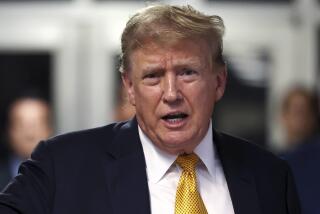Defense Says Stewart Too Tidy for Sloppy Conspiracy
- Share via
NEW YORK — If a perfectionist like Martha Stewart were going to cook up a conspiracy, her chief defense lawyer argued Tuesday, the result would never be as sloppy and inconsistent as the one the government alleges.
Robert G. Morvillo, in a three-hour closing statement in U.S. District Court, pointed to the “major, gaping, huge holes” in the alleged cover story of Stewart and her former stockbroker, Peter E. Bacanovic, to insist that the government’s theory makes no sense.
The inconsistencies in the two defendants’ recollections of Stewart’s Dec. 27, 2001, sale of ImClone Systems Inc. stock and the events that followed point instead to innocent memory flaws -- lapses blown out of proportion by a government “overreaching” to prosecute the celebrity entrepreneur, Morvillo argued.
“I ask you to acquit Martha Stewart and let her return to her life and improve the quality of life for all of us,” Morvillo said.
Invoking one of Stewart’s signature phrases, he added: “If you do that, it’s a good thing.”
Lead prosecutor Karen Patton Seymour, in a 90-minute rebuttal, countered that smart, successful people do indeed do stupid things. “That’s what white-collar criminals do every day,” she said. “The fact that this wasn’t all tidied up and perfect doesn’t mean it didn’t happen.”
The five-week trial is expected to reach the jury of eight women and four men today after U.S. District Judge Miriam Goldman Cedarbaum delivers detailed legal instructions.
Stewart, 62, and Bacanovic, 41, are charged with conspiracy, lying to investigators and obstructing justice in connection with their alleged attempt to conceal the reason for her ImClone sale. Cedarbaum last week threw out the most serious charge against Stewart -- securities fraud -- but the four felony counts she faces carry total penalties of up to 20 years in prison. Bacanovic, also charged with perjury, faces up to 25 years.
Prosecutors say that Stewart sold her stock immediately after Bacanovic had his assistant pass a tip that ImClone founder Samuel D. Waksal and family members were trying to dump their own stock. A regulatory setback the next day sent shares of the biotech firm tumbling.
Morvillo, 66, is the most theatrical of the eight lawyers to have spoken during the trial. On Tuesday, he gesticulated broadly, pointing and making chopping motions with his hands, and raised his voice from a whisper to a near-bellow.
Stewart, in a tan pantsuit, watched the proceedings closely with a grim expression.
Morvillo conceded that Bacanovic’s aide, star prosecution witness Douglas Faneuil, informed Stewart of Waksal’s efforts to sell. However, Morvillo and Richard Strassberg, Bacanovic’s lawyer, said Faneuil gave her the news on his own initiative to curry favor with the famous client.
Morvillo and Strassberg, who finished his closing argument Tuesday morning, both insisted that the reason for the sale was a previous arrangement between Stewart and Bacanovic to sell her ImClone stake when it fell to $60 a share. The defense said the government failed to prove that no such arrangement existed.
Stewart and Bacanovic, in separate interviews with federal authorities, disagreed about when the $60 sale agreement was made and about whether they had spoken with each other in January 2002 about the pending investigation. True conspirators, Morvillo said, would have ironed out such details in advance.
The defense portrayed prosecution witness Faneuil as a practiced liar who cut a deal with the government to save himself. Faneuil, Morvillo said, is “the living definition of reasonable doubt.”
Prosecutor Seymour pounded away at Stewart’s statement to federal investigators in February 2002 that she did not recall being informed of the Waksals’ attempted sales. The prosecutor noted that Stewart was a close friend of Samuel Waksal and that such information would have stuck in her mind.
More to Read
Inside the business of entertainment
The Wide Shot brings you news, analysis and insights on everything from streaming wars to production — and what it all means for the future.
You may occasionally receive promotional content from the Los Angeles Times.










